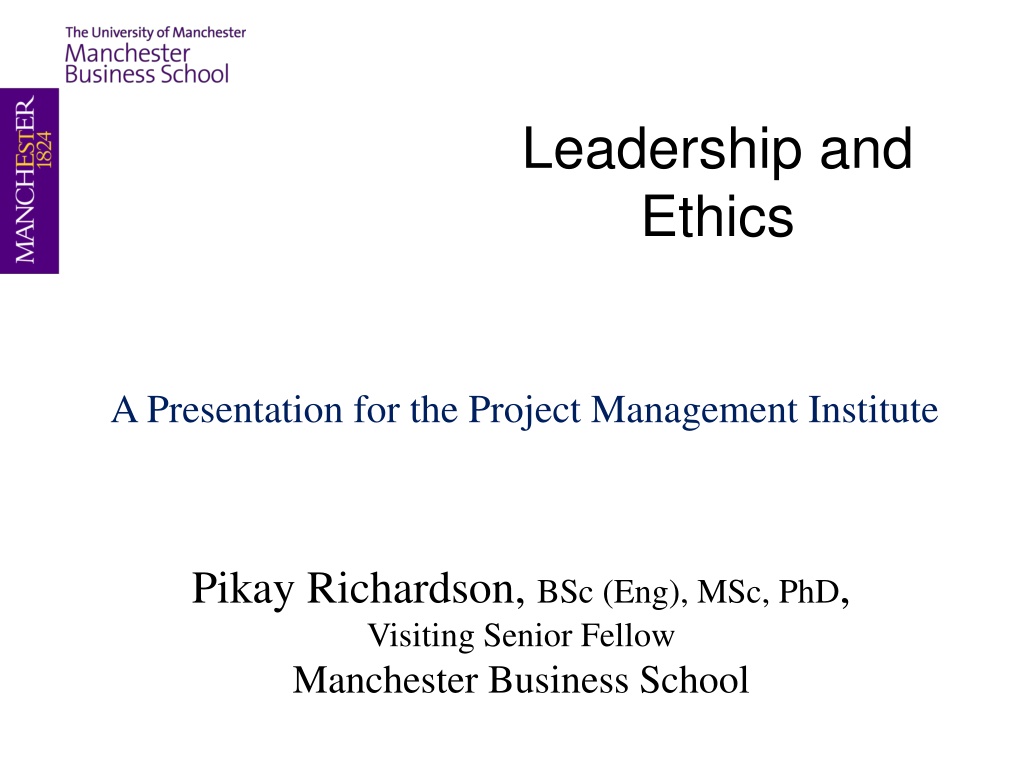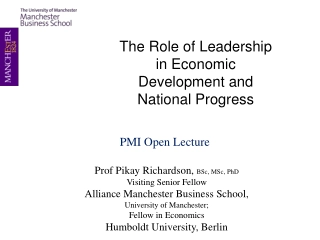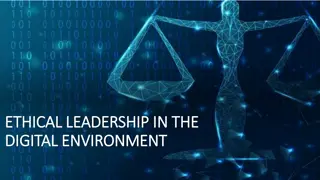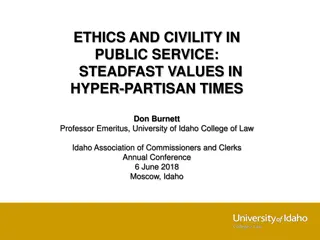Leadership and Ethics: A Presentation by Pikay Richardson
Explore the significance of leadership and ethics in the business world through a presentation by Pikay Richardson, a distinguished academic with extensive experience in engineering, management, and teaching. Discover the essential role of ethical leadership, its impact on organizational success, and how it shapes a positive vision for the future.
Download Presentation

Please find below an Image/Link to download the presentation.
The content on the website is provided AS IS for your information and personal use only. It may not be sold, licensed, or shared on other websites without obtaining consent from the author. Download presentation by click this link. If you encounter any issues during the download, it is possible that the publisher has removed the file from their server.
E N D
Presentation Transcript
Leadership and Ethics A Presentation for the Project Management Institute Pikay Richardson, BSc (Eng), MSc, PhD, Visiting Senior Fellow Manchester Business School
Pikay Richardson, BSc (Eng), MSc, PhD * Degrees in Engineering and Management. * Currently, Visiting Senior Fellow, MBS, UM * Institute Fellow, Humboldt University, Berlin, Germany * 17 years: Snr. Fellow, Manchester Business School; * Prof. of Business, University of Botswana. * Professor and Academic Director, NJIT, Newark, NJ, USA, 2000-2002 * Teaching Expertise: Business Economics; Strategy; Leadership; Ethics and Corporate Governance; Marketing, Int. Business, Organisational Behaviour. * International experience: UK, US, France, Germany, China, India, Dubai, Hong Kong, Singapore, Malaysia, SA, Botswana, Nigeria, Jamaica, Nigeria and Ghana.
Introduction/Breaking the Ice Encounter at the Executive Lunge, KIA Invitation to Deliver Ethical Business Operation to SHV in Amsterdam The D-Day, 5th June 2015 Question to Senior People: Does your organisation have a Vision?; What makes you sleepless at night?
Coverage 1. Leadership what it is and why important 2. The PIVOT around which Leadership revolves Ethics; What is Ethics? 3. How does it relate to Leadership? 4. How bad Ethics destroys Leadership 5. Becoming an Ethical leader 6. Finale
1. Leadership what it is and why important
Human Progress: The Factors 1. Competence; Knowledge; Know-how; Skill 2. The Will; Heart; Desire; Dedication; Keenness to get accomplished What has been determined as the Right Thing to do, and doing it Right (Effective Leadership) 3. Resources (Money/Capital)
Leadership: The Vital Ingredient System design, System Change The Right Things v/s Things Right Policy formulation, Strategy and Execution Providing direction and guidance Providing Hope Societal, national, organisational progress In every area of human endeavour the primary ingredient for success is LEADERSHIP
Leadership and the Status Quo Every system is perfectly designed to get the results that it is getting today. For a different of better results, the system needs to change. This requires Leadership
Leadership: The Vital Ingredient System design, System Change The Right Things v/s Things Right Policy formulation, Strategy and Execution Providing direction and guidance Providing Hope Societal, national, organisational progress In every area of human endeavour the primary ingredient for success is LEADERSHIP
What is Leadership? Leadership is a process whereby an individual influences a group of individuals to achieve a common goal.
What is Leadership? Leadership: is a process, activity, and not a PERSON involves influence occurs within a group context involves a common goal
Seven Attributes of Successful Leaders 1. Sound Ethical/Moral Compass 2. Ability to take unpleasant decisions 3. Ambition, Clarity and Focus 4. Effective Communication Skills 5. A knack for developing talent 6. Emotional self-confidence 7. Charm - charisma
What is Ethics? Ethics from ETHOS: customs, conduct, character. Ethics The basic concepts and fundamental principles of decent human conduct. It includes study of universal values such as the essential equality of all men and women, human or natural rights, obedience to the law of land, concern for health and safy and, increasingly, also for the natural environment
What is Ethics? In it simplest form, ETHICS constitute the moral standards we rely on when we make a decision. They define what s right and wrong, good and bad, and outline the kind of behaviour that people and businesses should not engage in. Ethics are not only a guide to making decisions, but also the criteria the public judge us on. In business, Ethics is critical, because how people see us and our company is the basis of building trust. Unethical actions lead to loss of credibility, which is detrimental to business.
Ethical Theory Ethical theory provides a system of rules or principles that guides us in making decisions about right or wrong and good or bad in a particular situation. It provides a basis for understanding what it means to be a morally decent human being. In Western tradition, the development of ethical theory dates back to Plato (427-347 BC) .
Re-cap: What is Leadership? Leadership is a process whereby an individual influences a group of individuals to achieve a common goal. Leadership: is a process, activity, and not a PERSON involves influence occurs within a group context involves a common goal
Effective Leadership Dependent on Ability to influence and achieve followership, and this in turn is Dependent on TRUST, which in turn is Dependent on Leader s character and conduct (Ethics)
Ethical Theory and Leadership With regard to Leadership, Ethics has to do with what leaders do and who leaders are Comprise two broad domains 1. Theories about person s conduct (actions) 2. Theories about person s character (who they are
1. Assessing Conduct Focuses on the actions of leaders and their moral obligations and responsibilities to do the right thing. - Is the action itself good? (Irrespective of consequences) Telling the truth (Clinton) Keeping promises Being fair Respecting others
2. Theories about Leaders Character (virtue-based) Focuses on Leaders as people with - virtues and moral abilities. These can be acquired and learned through practice A moral person demonstrates the following: - courage, temperance, generosity, self- control, honesty, sociability, modesty, fairness and justice
Ethics is Central to Leadership Leaders must influence followers rightly (moral responsibility) establish and enforce organisational value promote right values as these impact on organisational values play a major role in establishing the ethical climate of their organisation
Responsibility Responsibility is our duty to take ownership for the decisions we make or fail to make, the actions we take or fail to take, and the consequences that result.
Respect Respect is our duty to show a high regard for ourselves, others, and the resources entrusted to us. Resources entrusted to us may include people, money, reputation, the safety of others, and natural or environmental resources. An environment of respect engenders trust, confidence, and performance excellence by fostering mutual cooperation an environment where diverse perspectives and views are encouraged and valued.
Fairness Fairness is our duty to make decisions and act impartially and objectively. Our conduct must be free from competing self interest, prejudice, and favouritism
Honesty Honesty is our duty to understand the truth and act in a truthful manner both in our communications and in our conduct.
Principles of Ethical Leadership Respects Others Builds Community Serves Others Ethical Leadership Manifests Honesty Shows Justice
4. How Unethical Behaviour is Inimical to Effective Leadership
BBC Breaking News, 9th April 2015 An Indian court has sentenced the former head of Satyam Computers, Ramlinga Raju, and nine others, to seven years in prison in one of the country's biggest ever corporate scandals.
BBC Breaking News Ramalinga Raju, who founded the software services giant, admitted to accounting malpractices. The collapse of Satyam Computers in 2009 cost shareholders more than $2bn and rocked India's IT industry. It is the biggest fraud at a listed company in India. Raju was also fined $800,000. On conviction, Raju and others faced a maximum sentence life in jail.
The Reality on the Ground: A Difficult/Unethical Business Environment Today s global project manager is faced with: A dynamic, volatile and highly competitive business environment Uncertain economic futures Increasing demands from shareholders, investors and a diverse and sophisticated workforce Unethical business practices corruption, etc Need to continuously develop and implement winning strategies to keep earning a living or keeping his companies afloat
...even more Daunting in Ghana... the project manager increasingly has to operate in an environment characterised by + Fierce competition and time pressure + Dishonesty alternative truths ; economic truths + Nepotism and favouritism (who to use) + Pressure to cut corners or cook the books (compromise quality and safety) + Lack of integrity (project cost inflation) + Corruption
..hence the pressure (temptation?) to.. be dishonest (lying to get the business) cut corners (quality, health and safety) be fraudulent, crooked - contracts cheat, inflate costs of projects cook the books, fudge the figures under-invoice, over-invoice subvert the law/regulation In short be UNETHICAL, and go for the end justifies the means
.. but unethical business practices don t pay.. Companies fail ultimately payback time Company reputations are destroyed Shareholders lose billions Confidence and trust are shattered Jobs are lost and lives destroyed Executives are jailed and their reputations forever destroyed (may get away in Ghana)
Bad Ethical Behaviour is Detrimental to Corporate Reputation Just as character matters in people, it matters in organizations, says Justin Schultz, a corporate psychologist in Denver.
GSK in China In 2014, British pharmaceutical giant GlaxoSmithKline (GSK) was found guilty of bribery and ordered to pay a fine of 3 billion Yuan by a Chinese court. GSK sales executives were accused of paying Chinese doctors to use the company's pharmaceuticals
Chairman Ken Lay of Enron "As officers and employees of the Enron Corp., its subsidiaries, and its affiliated companies, we are responsible for conducting the business affairs of the companies in accordance with all applicable laws and in a moral and honest manner."
Enron Timeline Year 2000: Revenue: S101bn Employment (US): 21,000 Countries of operation: 40 December 2001: Financial statement fraud detected Enron files for bankruptcy
Olympus in Japan Michael Woodford was appointed CEO of Japanese lens company Olympus in 2011, and quickly discovered the company was disguising its business losses as write-offs. (For example, US$700 million in "advisory fees" to an entity in the Cayman Islands.) Woodford found these unusual transactions stretched to the 1990s and totalled around US$1.7 billion. He was dismissed by the board when he challenged them and blew the whistle.
Latest Case (Jan 2017): Rolls Royce In a vindication of the strategy pursued by Britain s Serious Fraud Office, Rolls Royce settled claims dating from 1989 to 2003 that it had bribed officials in various countries in order to win contracts. The engineering company has to pay penalties totalling 671m ($809m) to regulators in America, Brazil and Britain. Most of the money goes to the SFO, which pushed for a deferred prosecution agreement.
And there are others Ahold of the Netherlands Parmalat of Italy WorldCom of the US Xerox of the US Arthur Anderson
High Cost of Unethical Behaviour to Business Leaders and their Companies Lord Browne of BP - spent company money on gay lover; disgraced Mike Hurd of HP - sex scandal involving a female contractor that violated company s business standards Paul Wolfowitz of the World Bank - as president of the World Bank moved his girlfriend to the State Department and paid her above Sec. of State Cardinal Cody of Archbishop of Chicago - 1981 spent over $1m of church funds on his mistress
Ethics is Good for Business Being Ethical is Profitable: Some companies falsely believe that being ethical is an expensive practice that causes an organization to forego profits. In fact, ethics is about following what is right for society, customers and stakeholders while keeping the organization s long-term vision in mind
Maintaining High Ethical Standards is Good for Business A higher moral standing within employees and the organization helps to attract new customers builds higher customer loyalty reduces the risk of negative press or backlash caused by doing the wrong things helps to make a positive impact on the community
Code of Ethics A Code of Ethics is a document that stipulates morally acceptable behaviour within an organisation. It defines the moral standards or guidelines that need to be respected by all members of an organisation in their dealings with internal and external stakeholders - Rossouw Deon, 2002, Business ethics in Africa, OUP, Cape town. A Code of Ethics underpins the values of any organisation. Without it an organisation will have no moral compass - Kenneth Ruston, Director of the Institute of Business Ethics, London
Code of Ethics of the PMI Vision and Purpose: As practitioners of project management, we are committed to doing what is right and honourable Code based on the 4 Values of - Responsibility; Respect; Fairness and Honesty
Do You Relate to This? In Matthew 12:33, we read: "Make a tree good and its fruit will be good, or make a tree bad and its fruit will be bad, for a tree is recognised by its fruit".























